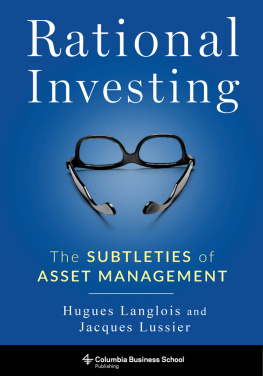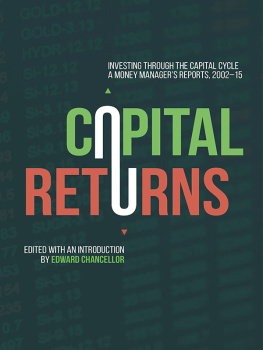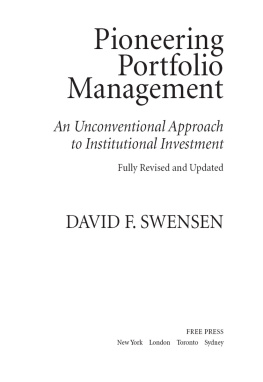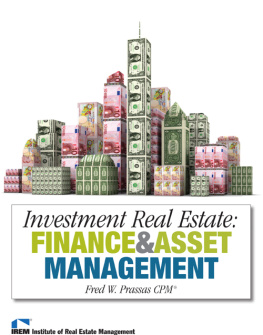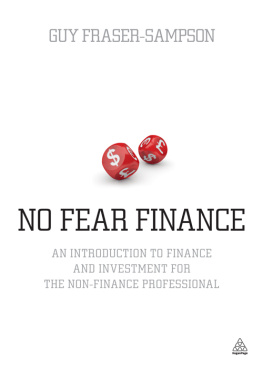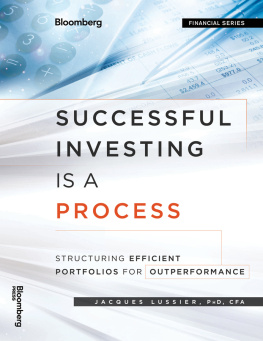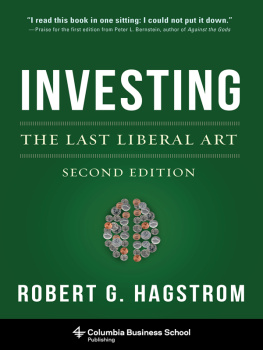Table of Contents
Rational Investing
Columbia University Press
Publishers Since 1893
New York Chichester, West Sussex
cup.columbia.edu
Copyright 2017 Columbia University Press
All rights reserved
E-ISBN 978-0-231-54378-1
Names: Langlois, Hugues, 1983- author. | Lussier, Jacques (Investment Strategist), author.
Title: Rational investing : the subtleties of asset management / Hugues Langlois and Jacques Lussier.
Description: New York : Columbia University Press, [2016] | Includes bibliographical references and index.
Identifiers: LCCN 2016039622 | ISBN 9780231177344 (cloth : alk. paper)
Subjects: LCSH: Portfolio management. | Investments.
Classification: LCC HG4529.5 .L87 2016 | DDC 332.6dc23
LC record available at https://lccn.loc.gov/2016039622
A Columbia University Press E-book.
CUP would be pleased to hear about your reading experience with this e-book at .
Cover design: Noah Arlow
Contents
THIS BOOK IS ABOUT bridging the gap between simplicity and complexity in asset management. It is about providing nonprofessional investors with an understanding of what underlies investment success while still making investment professionals reflect on many issues they may have forgotten or overlooked. It is about achieving these objectives in fewer than two hundred pages because the essence and clarity of a message are often lost in the thickness or the specialization of the medium of communication. And it is a tremendous challenge.
It is a challenge because asset management is an industry in which conflicts of interest are omnipresent, and the conversation is often adjusted to protect the interests of some of the players. In the last twenty years, the asset management industry has not only developed better investment strategies, but unfortunately also ways to package existing investment products and repackage old ideas, often at a higher cost. You may have already heard of the separation of alpha and beta; alpha overlay or transport; alternative, exotic, and now smart beta; fundamental indexing; core versus satellite components; liability-driven investment (LDI); performance-seeking portfolios (PSP); etc. It is a challenge to succinctly present a framework for understanding all of these concepts while each is often improperly pushed as a distinctive breakthrough. It is nonetheless the objective of this book.
It is also a challenge because asset management is not just about financial concepts. It is also about economics more generally, mathematics, statistics, psychology, history, and sociology. A comprehensive investment approach requires a comprehensive understanding of all these fields, a knowledge base few of us have. Investors education is therefore both essential and difficult. Building a lasting cumulative body of knowledge requires drawing evidence from many different literatures. The objective of this book is to provide the broadest possible understanding of the factors that drive investment successes and failures while avoiding as much as possible the complexity, biases, and noise that surround it.
Given these complexities, it is not surprising to see that there is a significant divide between the enormous body of literature developed by financial academicians and the body of research and practices accumulated by practitioners. Once we integrate knowledge from different areas of literature and work hard at making our thinking clean and simple, it becomes easier to explain the sources of success in terms that most investors can understand.
The main objective of this book is to explain all structural sources of performance and to illustrate their implementation. To this end, we cover many topics. We will discuss that there are talented and skilled professional fund managers out there, but that unfortunately not a lot of the value they create ends up in investors pockets. We will show that forecasting expected returns is not a useless endeavor, but it is usually not the primary source of sustainable excess performance of successful managers despite the rhetoric.
This book was written with the objective of communicating what is required to invest rationally while making its content accessible to as wide an audience as possible. It avoids the overuse of equations and of complex terminologies. In fact, we have managed to write this entire book with just a few equations. The length limitation we imposed on ourselves also dictates that we concentrate on the most relevant concepts and evidence.
The framework used in this book is not revolutionary, nor do we need it to be. We are not reinventing the wheel. We are presenting an overall picture of asset management through which we are going to underline many subtleties of this fascinating field that can allow us to sustainably outperform others. Investing in financial markets is a lottery only if we do not understand what drives long-term performance.
What This Book Is Not About
This book is not about saying that markets are perfectly efficient or inefficient. Market efficiency says that all the information relevant to the valuation of an investment is reflected in its price. If the price of any asset perfectly reflected its true fundamental value, there would be no point in spending resources trying to spot good investment opportunities to beat the market. Whatever you buy, you get a fair price for the risk you are getting into. But market inefficiency proponents point out that investors are not perfectly rational investing robots. They are influenced by their emotions and behavioral biases, and as a result asset prices can differ from their fundamental values in such a way that riskless profits can be made. Hence an investor could beat the market by looking for good investment opportunities.
It cant be that easy; prices cannot be completely irrational and erratic. Many smart investors compete with each other to profit from potential market inefficiencies, and few are able to make a killing at it. The reality lies in between. Markets have to be inefficient enough to make it worthwhile for investors to spend time and resources analyzing different investments and looking for good opportunities. But they cannot be so inefficient that it is easy to beat the market. If undervalued securities could be spotted easily, all investors could buy them and push up their prices to a fair level. A similar argument applies to overvalued securities. To borrow the characterization from Lasse Pedersen, professor of finance at New York University Stern School of Business and Copenhagen Business School, markets are efficiently inefficient. This book discusses sources of investment profits coming from both sides: rational compensations for the risks supported by investors and irrationalities in financial markets caused by emotions and other behavioral aspects.
On a related note, this book is not about taking sides in the debate between passive and active management. Passive managers simply invest in the market index, that is, a portfolio that includes all assets whose allocations depend on their market capitalization (i.e., their market value), such as buying the S&P 500 Index. Active managers look for good investments and try to beat the market index. Widespread evidence shows that most active managers fail to outperform the market index, and since the first index fund was launched in the 1970s, passive investments have gained in popularity. Exchange traded funds (ETF) now offer the possibility for investors to invest in a wide variety of market indexes at a low cost. Who is right? Again, the reality lies in between. There are talented investors out there and we all have a lot to learn from them. The important issue is how much of their performance actually trickles down to investors pockets. For an active fund to be a good investment opportunity, its managers have to be good enough to cover trading costs as well as the management fees that they charge you. Accordingly, this book does not take a stance on whether you should be an active or a passive investor. Rather, it analyzes the factors that should impact your decision.



